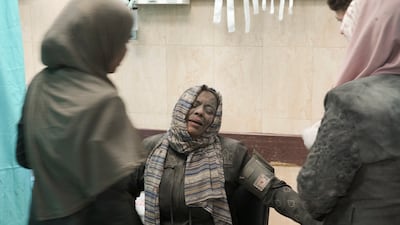Live updates: Follow the latest news on Israel-Gaza
At least 12 hospitals and 32 clinics in the Gaza Strip have been shut due to a lack of power and the damage caused by Israeli air strikes, the Palestinian Health Ministry has said.
The closures have come in the two weeks since the deadly Hamas attack in southern Israel that led to a retaliatory siege of Gaza and heavy air strikes, resulting in the killing of more than 5,000 Palestinians and displacement of over one million.
One Red Cross official working closely on the crisis told The National that hospitals were now so over-crowded, many people were taking refuge "in stairwells."
“Since 7 October, 12 hospitals and 32 primary care clinics across Gaza have been forced to shut down due to damage they had sustained or lack of electricity and supplies,” the Palestinian Health Ministry said on Tuesday.
The enclave's Al Shifaa hospital, which is harbouring 45,000 displaced people and more than 600 wounded and injured patients, is on the verge of collapse as it runs out of medical supplies and beds, Dr Marwan Abu Saad, director general of health co-operation at the ministry, told The National.
Hospitals are full and cannot keep up with the influx of people and an increase in electricity and water consumption, officials said. Aid lorries carrying food, water and medicine have begun to enter Palestinian territory through Egypt's Rafah crossing but humanitarian groups have said this is a “drop in the ocean” of what is needed.
Gaza's health system has reached “the worse stage in its history”, said Ashraf Al Qudra, spokesman for the ministry on social media platform X, previously known as Twitter.
Dr Abu Saad said they were attempting to find solutions “but they are not realistic”.
“If the air strikes continue, then we will not be able to cater to this amount of people,” he said.
“The hospital and its surrounding [area have] been targeted various times and every hour we receive a huge number of patients. We don't have any more beds to offer, so the majority of new patients are getting treatment on the floor.”
A collapse of health services at the hospital could come within hours, Dr Abu Saad said.
The Indonesian Hospital in northern Gaza’s Beit Lahia area was shut down after running out of power, Hamas said, with the militant group accusing Israel of committing “crimes against humanity”.
Health workers are “seeing people die” every minute, Atif Khloot, general manager of the Indonesian Hospital, told The National.
“The hospital has totally collapsed and the world has signed off on the murder of sick patients,” he said.
“We are urging the international community to focus and provide international aid and doctors for Gaza's healthcare system,” Mr Khloot said.
The hospital needs at least 2,000 litres of fuel a day to operate.
Humanitarian groups have warned that Gaza urgently needs fuel supplies to power desalination plants, pump drinking water and operate life-saving equipment.
Hospitals, particularly in the north, are “inundated”, Jessica Moussan, the International Committee of the Red Cross media adviser for the Middle East, told The National.
“Staff are overwhelmed, resources are depleting and many are seeking refuge within these hospital walls, with some even finding shelter in stairwells,” Ms Moussan said.
“Health care is most vulnerable, yet most needed.”
Medical teams are working under “appalling conditions” and are “emotionally and physically drained”, apart from facing significant threats to their own safety, she said.
Doctors are treating doctors and nurses treating nurses “in a cycle that should never be”, she said.













































